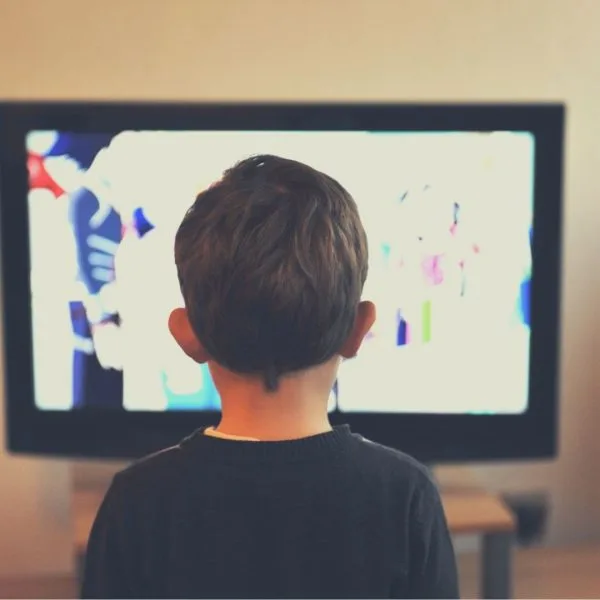Is screen time bad for kids?
Many parents wonder how bad screen time is for their kids. In the age of screens, it’s easy to let kids watch TV and play on tablets way too often.
Experts say the best policy is no screen time for kids 2 and under. (This is can be a difficult policy to enforce. Parents often arm themselves with portable kid activities that are easy to pack in your purse or diaper bag).
But even once your kids are older, how much screen time is too much?
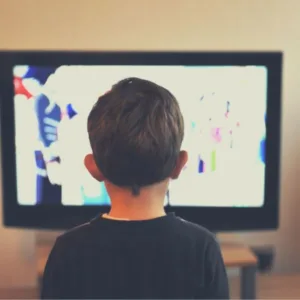
Is Screen Time Bad for Kids?
According to the Study for Adolescent Brain Cognitive Development (A.B.C.D), there is some association between lower test scores and heavy screen use. However, it’s unclear how long the effects of heavy screen usage truly last.
Because this study is ongoing (it will follow a group of 11,000+ children through adolescence), it’s unclear how much screen time is too much, or what the impact truly is on brain development. It will be years before the A.B.C.D Study is complete.
Even then, it will be difficult to guarantee that each individual’s report of personal screen time usage is accurate. There are many other factors that can influence brain development, aside from screen time. Additionally, there could be many positive effects alongside any negative effects. These factors mean that it would be difficult to say for sure how damaging or not damaging screen time truly is for kids.
However, parents can see the most immediate and obvious effects of screen time: the time spent glued to a screen takes away from other childhood experiences. The internet is littered with reports of children staying indoors more often as technology progresses.
Due to this, and the unknown extent that screen time may affect brain development, professionals recommend no more than one hour a day of screen time for children ages two to five. This ensures that parents are monitoring the amount of time being spent on screens versus other important childhood experiences, such as interacting with friends, playing outdoors, climbing a tree, or playing make-believe.
Limiting screen time also ensures that children get enough sleep, something that has already been proven to be vital for child growth and brain development.
Why I Let My Kids Have Screen Time…
It’s already been shown that screen time can have positive effects, too. Children are sponges who absorb everything around them. It’s easy to underestimate their ability to learn anything and everything. I’m sure I’m not the only parent who’s been surprised that my child knows something I thought was beyond their years (because they learned it from a T.V. show).
Kids emulate the good (or bad) behaviors they see on T.V.
When I was a kid, my little brother started hitting other kids on the playground. My mom banned him from watching shows like Star Wars, saying he was more aggressive when he watched “fighting” shows.
I always thought she was exaggerating, but after parenting two boys of my own, I can say with certainty that they copy the behaviors they see on T.V.
When my eldest had trouble sharing, we eliminated any shows with arguing or fighting. Instead, we let him watch shows like Little Einstein’s, Cleo and Cuquin, and True and the Magic Kingdom (yes, my son likes rainbows, wishes, unicorns, and magic trees; if girls can have boyish stuff, boys can have girlish stuff too).
Pretty soon, after observing the sharing behaviors of the characters in these shows, his sharing drastically improved.
Now, I’m not crediting T.V. for 100% of his behavior–we did a lot of work to teach him to share, too. But it certainly helped for him to see examples of those behaviors in characters he admired.
One of my favorite behaviors he adopted from Cleo and Cuquin is imaginative problem-solving. Even at the age of five, my son sometimes has meltdowns over the simplest things.
One day I asked him, “What do you think Cleo would do in this situation?”
In the show, Cleo is the problem-solver of the group. She always comes up with a solution that allows everyone to have fun.

Whenever I asked this question, my eldest would emulate her problem-solving strategies. Granted, this doesn’t happen all the time. Sometimes life is just too overwhelming for him to remember to do this. But whenever I remind him of Cleo, he stops and thinks.
Children learn from the shows they watch.
Just as kids absorb behaviors from T.V., they also absorb knowledge. My kids have a large vocabulary that often surprises adults.
Again, much of this is because we, the parents, use a large vocabulary when speaking to them. We don’t use “kid speak” in our house, because our kids are smart enough to figure out the meaning of a big word from context.
Still, more than once, my children have surprised me with vocabulary I know I didn’t teach them. When asked, they said they learned it from a show.
Not every show they watch is an A-B-C learning show. And not every show is a fantasy universe like Little Einstein’s. Sometimes, we just sit down and watch nature documentaries together. We talk about life and how the world works.
My boys are three and five. They know what ants eat, what a mammal is, and how caterpillars become butterflies.
In fact, one day, my littlest was laying in our hammock with his daddy. When I walked past, he exclaimed, “Look, mamma! We’re in a chrysalis!”
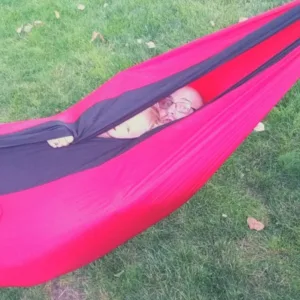
Yes, my three-year-old knows the word “chrysalis.” Even my husband and I were surprised, and we already knew how smart he is!
T.V. can aid in language immersion
In my case, my Au Pair, Adriana, has started teaching Spanish to my kids. At first, they were really resistant to learning a new language. They would recite the two words they remembered, then insist they “already knew” Spanish.
But when Adriana started playing Paw Patrol for them in Spanish, they didn’t seem to mind so much. She also turns on Spanish learning shows that get the kids repeat different words.
As a result, my kids now know a handful of words. They understand Adriana when she speaks to them in Spanish.
The other day, they heard a teachers speaking Spanish at church. My eldest walked up saying, “¿Cómo estás?”
After exclaiming at my blond-haired boy speaking Spanish without prompting, the teacher offered him a cookie.
My son said “¡Gracias!” without being prompted.

This might not seem like much—it certainly isn’t fluency. But it’s the first step down a long road of encouraging my kids to think in another language.
Screen time encourages family time (my personal favorite).
This might be a non-conventional opinion. But our family has bonded over screen time. Much in the same way a couple might bond by cuddling on the couch and having a movie night, my kids and I sometimes bond by watching a movie together.
We talk about the good and bad behaviors we see on T.V. Often, my kids will say, “He didn’t make a very good choice, did he?” On more than one occasion, we’ve talked about how much happier the characters would’ve been if they decided to share in the first place.
Kid shows can present a good opportunity to have important conversations. They can show your children, in a safe setting, that there are bad guys in the world, and that not everyone is going to be your friend.
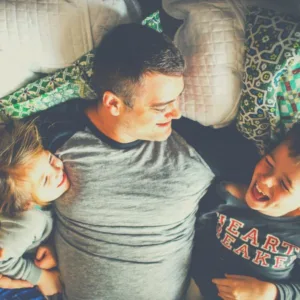
Even if you don’t use screen time to teach big life lessons, sometimes it’s nice to just sit together as a family, cuddle, and have a good laugh.
There are many other benefits to allowing your kids to have screen time.
I just listed the biggest benefits my family has experienced from allowing our kids to have screen time. However, experts say there are many more benefits that I didn’t list above, including:
- Improved interpersonal skills
- Enhanced problem-solving and intuition
- Increased hand-eye coordination
- For older children, improved socialization and communication
- Improved literacy from reading practice
According to Jordan Shapiro, a screen time research psychologist, parents should teach their kids how to “use screens with integrity.”
Shapiro told Business Insider, “[Screens] are a part of our lives so it becomes about teaching kids how to live with them in a healthy and ethical way,” and that parents should focus on “making their kids the best possible versions of themselves in the digital world.”
A recent report by the Royal College of Paediatrics and Child Health (RCPCH) in the UK supports this idea, too. According to the report, it is “impossible to recommend age-appropriate time limits… there is not enough evidence to confirm that screen time is in itself harmful to child health at any age.”
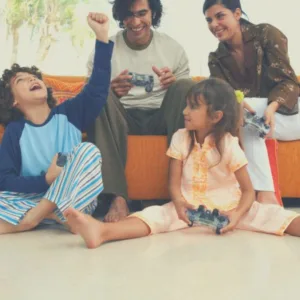
Dr. Max Davie, Officer for Health Promotion at RCPCH, says, “When it comes to screen time I think it is important to encourage parents to do what is right by their family.”
Quality of Parenting is More Important Than the Screen Time a Child Receives
As I mentioned above, my kids don’t always have “passive” screen time. Children, especially small children, have little means of knowing what’s real and what’s not. Thus, it’s vital for parents to be involved in their kids’ screen time experience as often as possible.
For example, after my kids saw Hotel Transylvania for the first time, they fully believed that Frankenstein’s monster, ghosts, mummies, vampires, and werewolves were real. We had a long talk about how many of the things on T.V. are made up. This wasn’t just one conversation, but several, as they see new things on T.V. all the time.
We haven’t given our Au Pair “screen time rules,” and here’s why.
I know this might sound crazy. I also realize that not every Au Pair will have the same life experience and prudent judgement as Adriana. However, we gave her the benefit of the doubt when it came to screen time, and it’s paid off.
We didn’t set specific time limits for screen time. There are no guidelines for whether or not the boys can watch T.V. during certain times of day. We didn’t tell her the kids can’t play with their tablets. Instead, we trusted her discretion and allowed her decide when enough was enough.
I have said many, many times that this trust is what’s made our placement successful. Because we gave her a vote of confidence, she didn’t let us down. If I had felt the kids were watching too much T.V., I would’ve said something. But I didn’t have to, because she never let it become an issue.
Adriana takes the kids to the park, the swimming pool, museums, the aquarium, the zoo, and out to play dates with other Au Pairs and their Host Kids. The kids might watch a little T.V. in the morning around breakfast time, but they spend most of the day out and about. Being active is important to Adriana, and she knows it’s important to us, too.

During her first weeks with us, Adriana thanked us for not being over-the-top about screen time. She expressed gratitude for having the flexibility to decide if the kids could have more T.V. one day because they didn’t have any T.V. the day before.
I completely understood where she was coming from. Because to be honest, sometimes T.V. can help a parent (or an Au Pair) keep their sanity.
Still Have Concerns About Screen Time? Be Sure to Talk to Your Au Pair.
Au Pairs want to support their Host Parents, not undermine them. So if you read this entier post, have weighed the pros and cons of too much or too little screen time, and you still have concerns, be sure to address it with your Au Pair.
Chances are, your Au Pair knows exactly how much screen time your children have while you’re away. It can be very beneficial to sit down and talk to your Au Pair about whether the kids are emulating the wrong behaviors from T.V., whether they’re getting enough sleep and exercise, or whether they have an unclear distinction between reality and the fantasies they see on a screen. All of these can be unhealthy effects of screen time and should be addressed immediately.
On the other hand, you may want your Au Pair to do what mine did, and start showing your kids more shows in another language!
In the end, how you handle screen time should reflect the unique needs of your family. As they say, mommy (or daddy) knows best!

